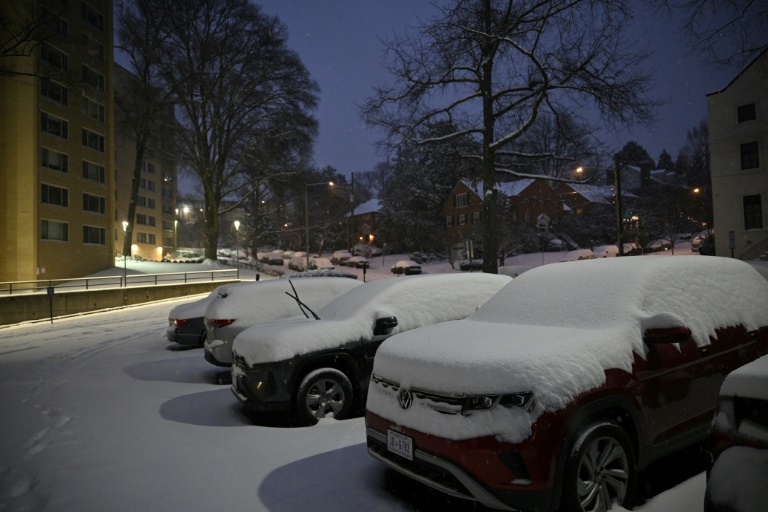A major storm system that blanketed a large swathe of the central and eastern United States in snow and ice — disrupting travel for millions and contributing to at least five deaths — was headed offshore Monday night, forecasters said.
Over 2,300 US flights were canceled on Monday with thousands more delayed amid the winter storm, tracking website FlightAware showed, compounding similar air travel headaches from the day before.
Meanwhile, nearly 200,000 customers remained without power from Missouri to Virginia as frigid temperatures settled in Monday night, according to Poweroutage.us, another tracking site.
The National Weather Service (NWS) said the event, the country’s first major winter storm of the year, “will be quickly exiting eastward into the western Atlantic tonight,” but that some small snowfall accumulations would continue to be possible in some mountainous and Mid-Atlantic areas.
Behind the storm, there was expected to be frigid temperatures for days, with cities such as Kansas City expecting windchills below zero degrees Fahrenheit (-17 degrees Celsius).
The mercury could sink tens of degrees below seasonal norms on the US Gulf Coast.
In Washington, several inches of snow did not hinder Congress from meeting to certify Donald Trump’s election victory, four years to the day after his supporters stormed the US Capitol to try to overturn his 2020 loss.
President Joe Biden was closely monitoring the severe weather and ready to support affected states, a White House spokesman said.
Many residents of the US capital, where federal offices and schools were closed due to the storm, spent the day outside enjoying the semi-rare snow day, with hundreds even participating in a mass snowball fight.
One woman trekking in skis told AFP she was excited to finally be able to use them this season.
“I probably get to do it once a year in DC because it doesn’t snow that much. But I love it,” said Nikki White.
As the storm tracked eastward, it brought blizzard conditions to Kansas and Missouri, while parts of Kentucky and elsewhere received dangerous coatings of ice, turning highways into ice rinks and downing trees.
The Missouri State Highway Patrol reported two weather-related fatalities, and side late Sunday it had responded to over 1,000 stranded motorists.
In Kansas, two people were killed after the vehicle they were traveling in spun out on a highway, while another person was killed after colliding with an out-of-control tractor trailer, the state’s highway patrol reported.
Video clips from Kansas showed cars skidding off ice-coated highways and tractor trailers jack-knifing.
The system was also blasting chilly winds across the Great Lakes into New York, where some areas have received multiple feet of so-called lake effect snow.
Conditions could prove especially perilous in the Appalachian mountain region, where a deadly hurricane in late September devastated communities and ravaged multiple southeastern states including Kentucky.
Scientists say extreme weather is becoming more common and more severe as a result of manmade climate change.
Several governors and local officials, including in Kentucky, Missouri, Virginia and Maryland have declared states of emergency and urged residents to stay home while emergency management works to clear roads.
Fresh on this storm’s heels, forecasters warned that another weather system was threatening to wreak more havoc later in the week, potentially bringing a rare major snowstorm to Texas as it heads east.
Texas Governor Greg Abbott said on X that he had activated state emergency response resources ahead of the “severe winter weather,” which forecasters say could bring multiple inches of snow accumulations to the Dallas metropolitan area.
There was also a possibility that another major snowstorm could develop in the Mid-Atlantic region by the weekend, but forecasters said the modeling was still highly uncertain.
In southern California, several areas were under warnings Monday for extreme winds and low humidity, severely increasing the threat of fast-spreading wildfires.
The California Office of Emergency Services said it was pre-positioning dozens of fire engines, eight helicopters, and crew ahead of the winds, which could bring gusts of up to 100 miles per hour (160 kilometers per hour).






